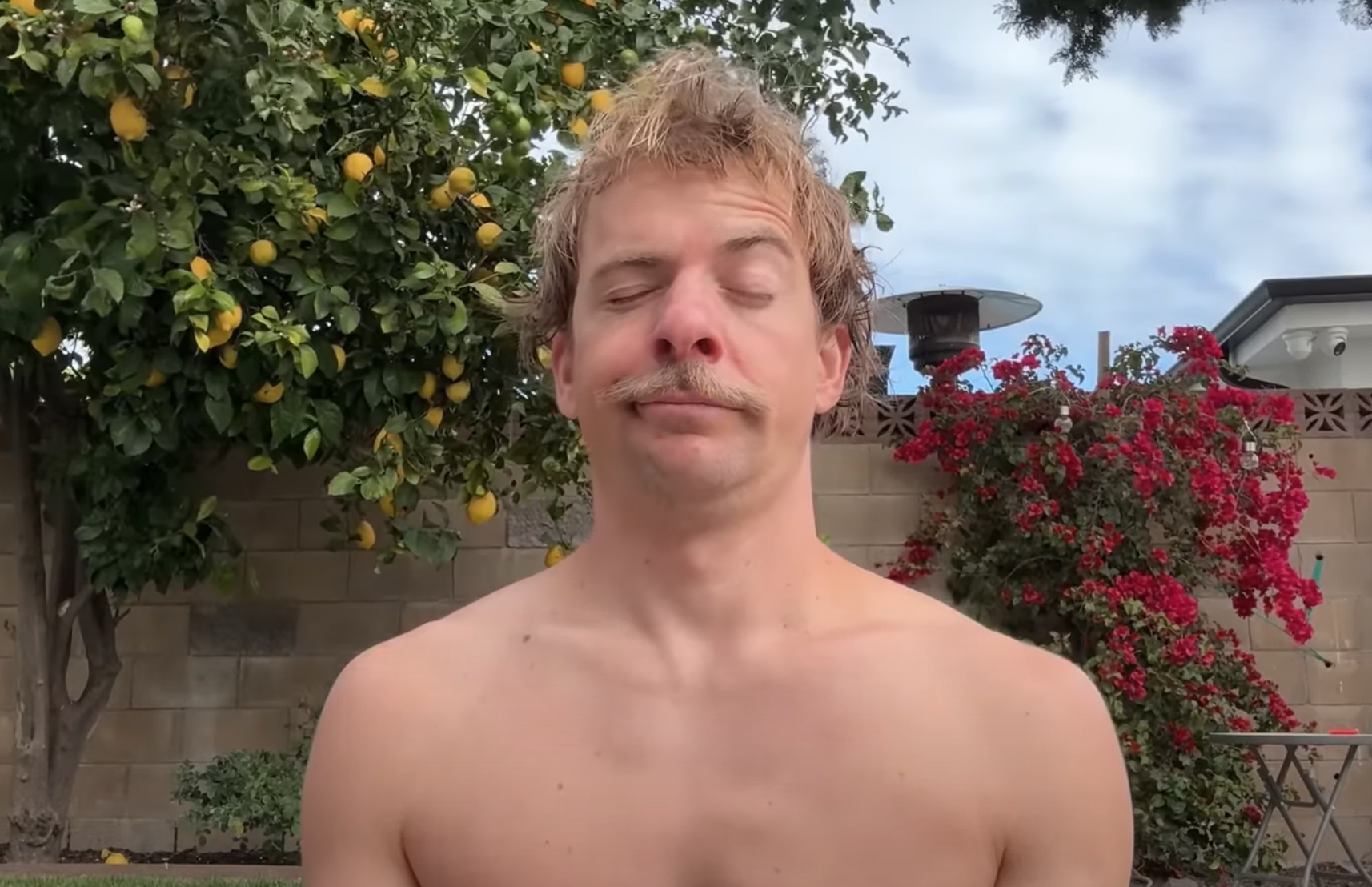
Chad Lebaron is an American social media star who makes silly funny comedy skits based on common pop culture.

Time's up
My name is Chance, and this is my morning routine for maximum productivity. So, I wake up at about 9:30, and I immediately make my bed. Studies show that if you do something productive, it’ll be a great start to your day. I make a nice cup of coffee; about 80 mgs of caffeine gets me up in the morning and keeps me going. Then I drink a huge glass of water. This is important because it lubricates your internal organs and activates your body’s various systems.
Then I meditate for about 40 minutes. Meditation is important because it reduces stress and helps me gather my thoughts throughout the day. Then I take an ice-cold shower. Studies have shown that cold water in the morning helps boost your metabolism, and there’s nothing like waking you up like some cold water. Then I go and trim my torso, and I shave my face so I look good for the day. Then I moisturize my face.
Then I like to go on a 2-hour long ride on my electric bike. I don’t ride a normal bike because, as you could tell, electric bikes go faster than normal bikes. Normal bikes are for poor people. Then I ride my KBO electric bike to the nearest abandoned warehouse. I meet my dominatrix girlfriend and put on a dog mask. She kicks me violently as a form of dominance. We do this for about 45 to 50 minutes. This exercise really helps me throughout the day; it helps me fulfill my submissive kinks and really helps me focus on my obligations.
My morning routine also includes riding around for miles trying to find an unattended dog to take with me. I put it in my doggy-safe backpack and ride around to find a secluded area to hide out. The hiding out is important because you don’t want to get caught in this act since you are stealing a dog. You wait for hours and hours and hours. You start to feel something you’ve never felt before, which is love—love for something, anything—and you want to wait out until the owner becomes scared that their dog is lost and puts up lost dog signs with a reward on it. The reward today is only $200, which isn’t going to cut it, so I abandoned the dog right there where I was waiting. Luckily, the KBO electric bike goes up to 20 mph, so leaving the dog there in the dust. Luckily, this is the most affordable e-bike, and it’s under $700. It covers up to 45 miles on a single charge and comes in various different colors. It folds in half, which makes it portable and easy to store.
Then I like to go to work, and by work, I mean calling my father who already went to work his whole life and asking him for money. He’s going to send me $100,000. Then I have to check on my hostage and make sure she’s still alive and didn’t escape.
- Get me up – Informal usage meaning to help someone become awake or alert.
- Example: A strong cup of coffee is what gets me up in the morning.
- Example: A strong cup of coffee is what gets me up in the morning.
- Keep me going – Phrasal verb meaning to provide the energy or motivation needed to continue an activity.
- Example: These energy bars keep me going during my long hikes.
- Example: These energy bars keep me going during my long hikes.
- Gather my thoughts – Phrasal verb meaning to collect and organize one’s thoughts or ideas.
- Example: Before the meeting, she took a few minutes to gather her thoughts.
- Example: Before the meeting, she took a few minutes to gather her thoughts.
- Boost your metabolism – Phrasal verb meaning to increase or enhance the rate at which the body processes food and burns calories.
- Example: Drinking green tea is said to boost your metabolism.
- Example: Drinking green tea is said to boost your metabolism.
- Trim my torso – Here “trim” means to cut or shave hair, not necessarily to reduce in size like in weight loss contexts.
- Example: He trimmed his beard to look neat for the interview.
- Example: He trimmed his beard to look neat for the interview.
- Go for – Phrasal verb can mean various things, here interpreted as “to engage in” or “to undertake.”
- Example: I’m going for a run after work today.
- Example: I’m going for a run after work today.
- Go on – Phrasal verb meaning to continue or to proceed with an activity.
- Example: Let’s go on with the presentation now.
- Example: Let’s go on with the presentation now.
- Ride around – Phrasal verb meaning to travel or move from place to place on a vehicle for leisure or exploration.
- Example: On Sundays, we like to ride around the countryside on our bikes.
- Example: On Sundays, we like to ride around the countryside on our bikes.
- Hide out – Phrasal verb meaning to go into hiding, to stay out of sight or to avoid detection. Example: After the prank, they had to hide out in the basement until the coast was clear.
- Wait out – Phrasal verb meaning to stay in a situation until it changes or resolves. Example: We had to wait out the storm in the car since it was too dangerous to drive.
- What do you think of Chance’s routine?
- Do you like satire comedy?
- What do you think of people’s routines nowadays? How is it different in different countries?
- Do you think people need a routine?
- Do you like your routine? Would you change anything about your routine?
- What time do you usually wake up in the morning?
- Do you find it easy to get up in the morning? Why or why not?
- What is the first thing you do after waking up?
- Do you have any morning rituals or routines that you follow every day?
- How do you usually start your day?
- Is your routine the same every day, or does it vary on weekends?
- Do you prefer a structured routine, or do you like spontaneity in your day?
- What part of your daily routine do you enjoy the most?
- Is there anything about your daily routine that you would like to change?
- How has your daily routine changed since you were younger?
- Do you think having a routine is beneficial? Why or why not?
- What do you usually do before going to bed?
- How important is exercise in your daily routine?
- Do you have any habits that you consider part of your routine?
- How do you adapt your routine when something unexpected happens?
Describe a typical day in your life.
You should say:
- what time you usually wake up
- what activities you do in the morning
- what you do during the rest of the day
- and explain why this routine is typical for you.
Talk about a change you made to your daily routine.
You should say:
- what the change was
- why you decided to make this change
- how you implemented it
- and describe the effects it had on your life.
Describe your morning routine.
You should say:
- what time you get up
- what you do before leaving home or starting your day
- why you think this routine works for you
Tell me about a habit you have in your routine that you find particularly useful or unproductive.
You should say:
- what the habit is
- how it fits into your daily routine
- how long you’ve had this habit
- and explain why you consider it useful or unproductive.
Describe an unusual routine or habit that someone you know has.
You should say:
- who this person is
- what their unusual routine or habit consists of
- how it differs from common practices
- and describe how you feel about it.
- What role does routine play in a person’s life?
- How do routines vary between different cultures?
- Do you think children should have a fixed routine? Why or why not?
- How can routines benefit someone’s mental health?
- Can having a very strict routine be negative in any way? Explain.
- How might job demands influence a person’s daily routine?
- Do you believe that routines are more important for productivity or for personal well-being?
- In what ways might technology affect daily routines now and in the future?
- How do routines change as people age?
- What impact do you think flexible working hours have on traditional daily routines?
- Is it possible to be successful without having a set routine? Discuss.
- How do societal expectations shape someone’s daily routine?
- How can someone start to develop a routine if they don’t have one?
- Do you think routines can help in dealing with stress? How?
- How might the routines of people in rural areas differ from those in urban areas?







